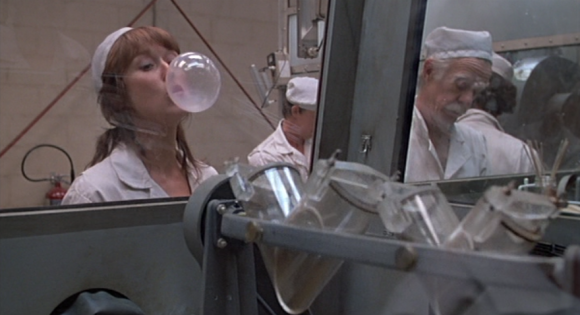“Plastics.” In the classic 1967 film The Graduate, that one word is a ridiculous punchline, but also a social critique. Party guest Mr. McGuire is trying to instill advice on lost college graduate Benjamin Braddock (Dustin Hoffman) about his future, yet unwittingly he’s also describing himself and his shallow social circle. Talk about economy of dialog. That timeless movie was directed by Mike Nichols, who passed away from cardiac arrest Wednesday night at the age of 83. Back when the film was released, Nichols couldn’t have predicted that single line of dialogue, in what was only his second film, would become so iconic. By extension, Nichols likely couldn’t have known all those years ago that his career – a groundbreaking one that stretched the art forms of the screens both large and small, as well as the stage – would loom so large and cast such an immense influence; yet there might have been an even greater design to that as well.
The news of his passing is sad – overwhelming in fact – as Nichols was one of the most celebrated fixtures of American film and stage for upwards of fifty years. Throughout his career, Nichols was an innovator, a humorist, and a humanist. He told stories with a sharply focused eye on the human experience, his worlds filled with easily relatable characters. Yet his work offered us something surprising. Always penetrable, but not always easy to suss out from the start. His style was ever-changing and adaptable, but there was an unmistakable quality to a Mike Nichols film. He famously became known an “actors director,” taking both already established talents to career heights and guiding unexpected greatness out of others. But was also an auteur in his own right, just one with harder-to-read imprimatur. As such, it’s a little difficult to know exactly where to begin, or how to tap into the sadness in thinking he’s actually gone.
Perhaps it’s best to start with The Graduate, the film that won Nichols the Academy Award for Best Director and in many ways helped redefine the landscape for American cinema. Adapted, quite loosely, from the novel by Charles Webb, the film tells the story of a Benjamin Braddock, an awkward young man unsure of his future – a relatively simple logline for what is a far-from-simple, utterly original piece of cinema. In the years since its release, the film has been imitated and copied so many times – you can see the DNA of the movie in nearly every coming-of-age movie made ever since – it’s almost unfathomable to think just how groundbreaking the film was when it opened in the 1960s. For one thing, it was a movie made for a younger audience that was just beginning to embrace the counterculture – still something of a novelty at the time.
With its classic Simon and Garfunkel soundtrack and artful, dreamy editing that makes visual clarity of just how lost Benjamin really is, The Graduate must have felt completely different back then, which helped it usher in the younger, hipper new wave that was about to dominate Hollywood filmmaking in the years following its release. Moreso, Nichols (with a screenplay written by Buck Henry and Calder Willingham) focused the film with sharp observations of the generation gap and underlined The Graduate with an acute questioning of the meaning of materialistic excess – that’s where “plastics” come in. The first stroke of genius in the film came with the casting (something of which would become a Nichols touchstone). In casting a then-unknown Dustin Hoffman as Benjamin, the movie made a bold, subversive move. In the novel, and certainly in premise, Benjamin is WASPy-type– blonde, upper class, a track star. Hoffman is Jewish, and well, awkward. Instantly, he’s something of an outsider in his own movie, an idea Nichols clearly ran with (Robert Redford was also up for the role, which would have made for a very different movie). Also, the film had an unabashed view of sexuality, fidelity, and notions of happily ever after (themes that would interest the director throughout his career), evident in the delicate final shot of its two young lovers staring straight ahead, completely unsure of what to do and what comes next.
The idea of the outsider was probably something familiar to Nichols long before he filmed The Graduate. Born Mikhail Igor Peschkowsky, he was born in Berlin, Germany in 1931. His family fled Nazi-occupied Germany in 1939 and moved to New York City; Nichols remarked the only words in English he knew at the time were “I don’t speak English” and “Please don’t kiss me.” He experienced a turbulent childhood with bouts of depression and suffered a bad reaction to a whooping cough inoculation at the age of four, which caused him to temporarily lose his hair. He may not have been aware of his calling at the time, but something clearly started to coalesce when Nichols entered the University of Chicago. It was there that he joined the Compass Players, a revue show and precursor to the famed Second City theater company. It was also there where he met Elaine May, who would become Nichols’ comedy partner and frequent film collaborator.
Nichols and May became a hit. As a comedy duo, the two performed sketches and routines in nightclubs, on radio, and on television, leading to three best-selling records and a 1960 Broadway show entitled An Evening with Mike Nichols and Elaine May. They won a Grammy Award in 1962 for Best Comedy Album – the first major award of Nichols’ career – and the “G” in his eventual EGOT collection. With his career in comedy already established, Nichols moved toward directing, first taking Broadway by storm. Frequently collaborating with playwright Neil Simon, Nichols became a force on the Great White Way, directing the runs of the hit shows Barefoot in the Park (1964), The Odd Couple (1965) and Plaza Suite (1968), winning Tonys for all three shows. Ever after Hollywood bit, Nichols frequently returned to stage and usually collected more trophies along the way. Nichols directed the classic Tom Stoppard play The Real Thing (1984), the original Monty Python musical Spamalot (2005), and most recently directed an acclaimed revival of Death of a Salesman (2012) with Philip Seymour Hoffman and Andrew Garfield. He also produced the musical phenom Annie (1977). He won nine Tony Awards in all and appropriately enough, the lights of Broadway will be dimmed for one minute on Friday, November 21st at 7:45PM, in his honor.
Yet it was the movies where Nichols painted his largest canvas. His debut feature was the film adaptation of the Edward Albee play Who’s Afraid of Virginia Woolf? starring Elizabeth Taylor (in an Oscar-winning performance) and Richard Burton as a sparring married couple. The film, released in 1966, was daring with its frank language – something that rattled the censors back then – its complicated themes, and striking black and white camera work. Nichols earned an Oscar nomination for Best Director. The next year The Graduate opened and a legacy was confirmed, even if his film work in the decade that followed led to diminishing of goods both critically and commercially. Nichols only made four films in 1970s – the challenging and provocative works lCatch- 22 (1970) and Carnal Knowledge (1971), and the misfires The Day of the Dolphin (1973) and The Fortune (1975).
The 1980s proved fertile for Mike Nichols, as the director rebounded with major works like Silkwood (1983), Heartburn (1986), and Working Girl (1988). On the surface there’s a sense he may have lost a bit of visual daring during this period, but Nichols reinforced a quality that was already a hallmark within his work – his astute work with actors. Whether by getting a performance of surprising range from the likes of Cher (who received an Oscar nomination for Silkwood) or Melanie Griffiths (Oscar-nominated for Working Girl) or John Travolta (in Primary Colors) or Robin Williams (in The Birdcage), Nichols had a genuine gift with actors. Perhaps the actor he had the greatest effect on was Meryl Streep, who was already an Oscar-winner and legend in her own right before working with Nichols for the first time in Silkwood. Nichols brought out an earthy naturalism in the four performances he directed her in, the latter of which being the masterful HBO mini-series Angels in America, for which the director won an Emmy. The duo were set to collaborate again for an HBO show called Master Class, but the sad news of Nichols’ passing changes all that.
In all Nichols directed 22 films throughout his career, leaving behind one of the most exceptional legacies the industry has ever seen. He is survived by his wife, Diane Sawyer, and three children. Fortunately, his work will always be around to provoke and inspire, and hopefully give joy to future generations of filmmakers and filmgoers.


